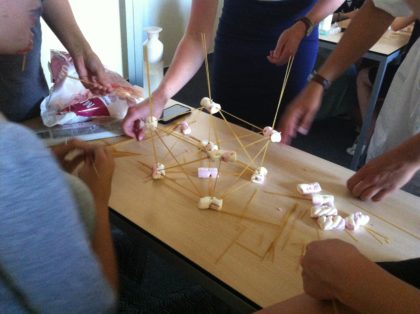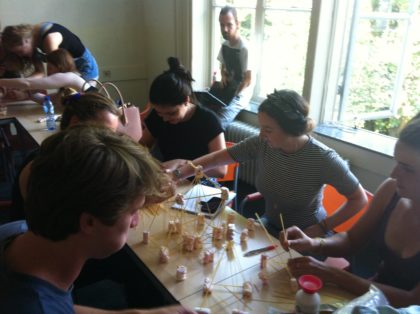How to playfully enhance the reflective capacity of students with marshmallows and spaghetti
Through bi-weekly posts, MA staff participating in the USO project on internationalisation will share concrete teaching tools and activities through which we aim to enhance ‘tailor-made’ internationalisation.
This week: a playful exercise to enhance the reflective capacity of students.
The UU aims to increase the diversity of its academic community and bring global awareness into its teaching programmes. In this simple and fun exercise students learn to reflect upon diversity through group work. The exercise builds upon the Mapping Diversity exercise as outlined by Mario Fumerton in his TAUU blog of 23 January 2017.
Learning outcome: “After successful completion of the MA, students are able to participate in group work productively, to take the lead on occasion, and to preside over debates and discussions, in an international and culturally mixed group” (OER 2017-18 MA Conflict Studies and Human Rights).
The exercise takes about 1,5 hour, you need a teaching room that offers enough space to work in groups of 5 (moveable furniture). And a bag of marshmallows and a pack of spaghetti per group. The exercise as outlined here is not new: it is used a lot in teamwork and leadership trainings.
BACKGROUND
Participation in an international classroom does not automatically lead to acquiring diversity awareness. That is the lessons we learnt from our pilot in this USO project. Despite their exposure to other cultures and social environments, many of our students in the MA Conflict Studies and Human Rights were not able to articulate or reflect sufficiently on their encounters with diversity, both within the classroom and in the field. In this playful exercise we zoom in on interpersonal differences and roles in group work.
The exercise takes place a week after the MA Introduction Days, during which students worked on Diversity Mapping.
THE EXERCISE
Ask students to form groups of 4-5, instruct them as follows:
1) Are you a diverse group? Do you need more diversity? Talk about and negotiate transfers with other groups.
2) After you have established groups of 4-5 we go to the exercise.
3) Take a pack of spaghetti and a bag of marshmallows and build a tower that will hold your phone within 20 minutes!

The lecturer walks around and observes, and does the ‘count down’ (“two more minutes!”).

After the exercise students are requested to reflect on the following questions:
a) How did you work together? How did you start? Did you ‘plot & plan’ or simply start building?
b) Was there a leader on your team? Who was it and who decided who the leader would be? If you had no leader, do you think having designated someone a leader would have helped?
c) If you had a leader, how did he/she do?
d) How helpful was everyone on your team in challenging the process of building the tallest structure? Did anyone appear to be an expert?
e) What kind of roles did people take? How was the division of labour decided on?
f) Did any team members tune out of the activity — out of frustration with other members or for some other reason? What could you have done to keep all members of the group fully engaged?
g) Did you feel everyone’s ideas were well received during the activity?
h) How did you feel as the time limit was approaching? Did pressure increase? If yes, was that helpful or not? In retrospect, what could you have done better?
i) Did you take time-outs to strategize and reflect? Where might new ideas have come from given your time constraint?
j) Did you celebrate small wins? If yes, how did you do this?
k) What was your role in the group? Are you OK with this? Do you plan to do things differently next time?
Discuss the main findings of each group in a plenary. To harness this first learning experience you may ask students to write a reflection paper based on the above questions, and reflect on their role (‘positionality’) in group work at different stages throughout the MA programme.
 3 april 2017
3 april 2017
U moet ingelogd zijn om te reageren, gebruik het formulier aan de linkerkant om in te loggen met uw solis gegevens.


